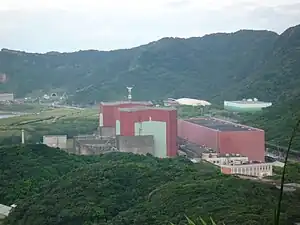Kuosheng Nuclear Power Plant
The Kuosheng Nuclear Power Plant or Guosheng Nuclear Power Plant (traditional Chinese: 國聖核能發電廠; simplified Chinese: 国圣核能发电厂; pinyin: Guóshèng Hénéng Fādiànchǎng), Second Nuclear Power Plant (第二核能發電廠 or 核二), is a nuclear power plant in Wanli District, New Taipei, Taiwan. The plant was the largest nuclear power plant in Taiwan.
| Kuosheng Nuclear Power Plant | |
|---|---|
 | |
| Official name | 國聖核能發電廠 |
| Country | Republic of China |
| Location | Wanli, New Taipei |
| Coordinates | 25°12′10″N 121°39′45″E |
| Status | Operational |
| Commission date | December 1981 (Unit 1) March 1983 (Unit 2) |
| Decommission date | 1 July 2021 (Unit 1) March 2023[1] |
| Owner(s) | Taipower |
| Operator(s) | Taipower[2] |
| Nuclear power station | |
| Reactor type | BWR-6 |
| Power generation | |
| Units decommissioned | 2 x 985 |
| Nameplate capacity |
|
| External links | |
| Commons | Related media on Commons |
Generation
The power plant could generate 16 billion kWh of electricity per year.[3] Both boiling water reactors had been retired by 2023.[1]
History
1981
The power plant was commissioned in December 1981.[4]
2010
On 7 October 2010, Unit 1 of the plant was shut down for refueling starting at 12:49 a.m. and was synchronized back to the system on 31 October at 12:14 p.m. establishing a new record in Taiwan for the shortest nuclear power plant overhaul duration of 24.48 days.[5]
2011
On 17 May 2011, Taipower and New Taipei City Fire Department organized the very first compound disaster drill in Taiwan. This event was held at the Kuosheng Nuclear Power Plant and observed by President Ma Ying-jeou. The training scenario was based on the events of the Fukushima Daiichi nuclear disaster that occurred on 11 March 2011. A statement issued by Taipower indicated that in the worst-case scenario, where the plant experiences total power failure, saving lives would be top priority. In this scenario, the plant would be abandoned and seawater injected to prevent the meltdown of the nuclear core.[6]
2012
During routine maintenance of the power plant on 16 March 2012, the plant maintenance workers discovered problems with seven anchor bolts used to secure the bottom of the nuclear reactor to the steel-reinforced concrete substrate that holds the weight of the reactor. One bolt was broken, two were fractured and four were cracked. Taipower said that they would consult relevant agencies to analyze and fix the problem and add vibration-monitoring sensors near the reactor base for continuous monitoring.[7]
2013
The plant's number one nuclear reactor automatically shut down on Friday, 21 June 2013. The automatic shutdown occurred because protective device was activated when the generator's grounding signal showed abnormal activity. This was a result of a loose blade in the air damper that fell onto the busbar insulator between the generator and main transformer. The incident did not damage the reactor and there was no release of radioactivity. Taipower mitigated the event by re-securing the blade and replacing the related components. The power plant was back online by Sunday, 23 June 2013.[8][9]
2015
On 26 December 2015, reactor number one shut down unexpectedly due to a problem with its control systems.[10]
2016
On 16 May 2016, reactor number two was suspended following a fire caused by a short circuit. The incident occurred shortly after operations resumed following annual maintenance. In 2018, technical approval for a restart was given, but actual restart is subject to parliamentary approval.[10][11]
On 30 May 2016, one of the reactors suddenly shut down.[12]
2017
Between 21-23 September 2017, an annual safety drill took place in which 10,000 personnel were mobilized. The drill was headed by the Atomic Energy Council Deputy Minister Chiu Tzu-tsung as commander-in-chief, Health and Welfare Deputy Minister Hsueh Jui-yuan, and Economic Affairs Deputy Minister Yang Wei-fuu as deputy commanders.[13]
2018
Kuosheng-2 goes operational, after the Atomic Energy Council of Taiwan approved the restart.[14]
2021
Kuosheng 1 was shut down permanently and entered decommissioning on 1 July 2021.[15]
2023
Kuosheng 2 was shut down permanently and entered decommissioning in March 2023.[1]
Awards
On 3 November 2010, the 6th 2010 Asia Power Awards in Singapore[5] awarded the plant a gold medal for the Best Operation and Maintenance Project for installing a 360-degree work platform over the nuclear reactor.
See also
References
- "Taiwanese reactor enters retirement". World Nuclear News. 14 March 2023. Retrieved 29 March 2023.
- "Kuosheng Nuclear Power Plant Taiwan - GEO". Globalenergyobservatory.org. 15 February 2010. Retrieved 1 May 2014.
- "Taipower mulls extending use of three nuclear plants". Taipei Times. 24 April 2014. Retrieved 1 May 2014.
- Proctor, Darrell (10 August 2021). "New GE Gas-Fired Plant Part of Taiwan's Energy Transition". POWER. Retrieved 18 August 2021.
- "Taiwan power company-Taipower Events". Taipower.com.tw. Archived from the original on 17 May 2014. Retrieved 3 June 2014.
- "Taiwan holds nuclear safety drill". Taipei Times. 24 April 2014. Retrieved 1 May 2014.
- "Taipower facing more questioning after damaged reactor anchor bolts revealed at Guosheng Nuclear Power Plant". Enformable. 4 March 2014. Archived from the original on 8 March 2014. Retrieved 1 May 2014.
- "No safety problems after shutdown at plant: Taipower". Taipei Times. 24 April 2014. Retrieved 1 May 2014.
- "Nuclear reactor operating after brief shutdown". The China Post. 24 June 2013. Retrieved 1 May 2014.
- "Reactor at 2nd nuclear power plant shut down unexpectedly - Focus Taiwan".
- "Taipower gets approval to restart Kuosheng 2". World Nuclear News. 6 March 2018. Retrieved 7 March 2018.
- "Reactor at New Taipei nuclear power plant shuts down - Society - FOCUS TAIWAN - CNA ENGLISH NEWS".
- Lin, Chia-nan (19 September 2017). "Nuclear safety drill to be held outside plant for first time". Taipei Times. Retrieved 19 September 2017.
- "PRIS Kuosheng-2 history". IAEA. 2018. Retrieved 13 November 2022.
- "Taiwan permanently closes Kuosheng 1". Nuclear Engineering International. 5 July 2021. Retrieved 5 July 2021.